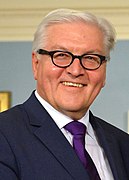| |||||||||||||||||||||||
1260 members of the Federal Convention 631 votes needed to win | |||||||||||||||||||||||
|---|---|---|---|---|---|---|---|---|---|---|---|---|---|---|---|---|---|---|---|---|---|---|---|
| |||||||||||||||||||||||
| |||||||||||||||||||||||
An indirect presidential election (officially the 16th Federal Convention) was held on 12 February 2017 to elect the 12th President of Germany. Incumbent President Joachim Gauck announced on 6 June 2016 that he would not stand for re-election, citing his advancing age.[1]
The President is elected by the Federal Convention, an electoral body that consists of all members of the current Bundestag and an equal number of electors, who are elected by the sixteen state parliaments. Frank-Walter Steinmeier of the Social Democratic Party was chosen as the single candidate of the ruling coalition in November 2016; with the Christian Democratic Union choosing not to field a candidate against him, his election was seen as guaranteed.[2][3] Steinmeier was elected on the first ballot, and took office on 19 March 2017.[4]
Cite error: There are <ref group=lower-alpha> tags or {{efn}} templates on this page, but the references will not show without a {{reflist|group=lower-alpha}} template or {{notelist}} template (see the help page).
- ^ Kate Connolly (6 June 2016). "Headache for Angela Merkel as German president Joachim Gauck steps down". The Guardian. Retrieved 7 June 2016.
- ^ Charter, David (13 February 2017). "Left wins presidency in new blow to Merkel". The Times. Retrieved 13 February 2017.
- ^ "Legislators vote for Frank-Walter Steinmeier as president". Graphic News. Retrieved 13 February 2017.
- ^ Election of the Federal President. Office of the Federal President. 12 February 2017. Retrieved 13 February 2017.

